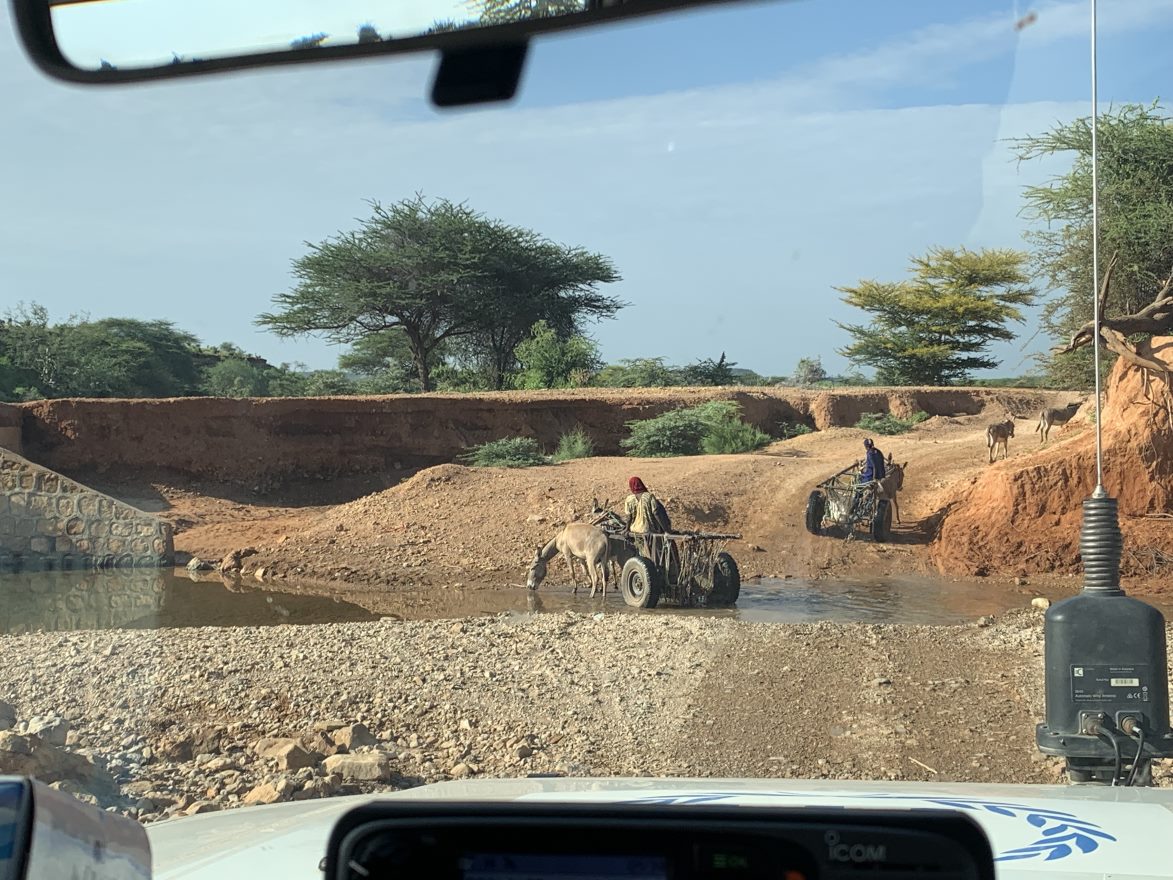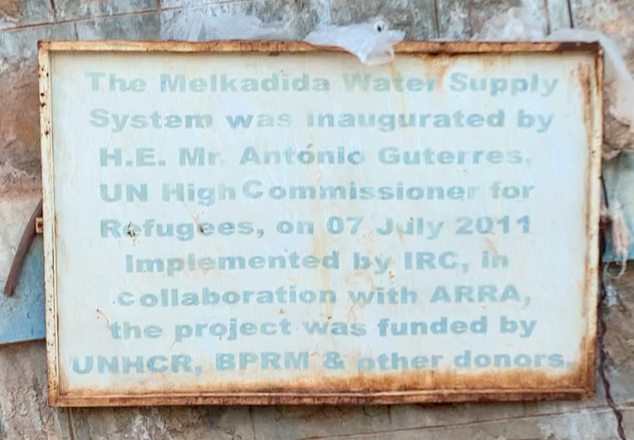IWMI researchers Radhika and Mengistu dig for answers in the field.
By Sandra Ruckstuhl & Terry Erle Clayton

The hunt is on
Radhika Singh (IWMI consultant) and Mengistu Dessalegn (IWMI researcher) are in Dolo Ado and Bokolmayo Woredas in Ethiopia’s Somali Region this month digging for information. There is a water crisis gripping the area and The United Nations Refugee Agency (UNHCR) is looking to the International Water Management Institute’s (IWMI) expertise to identify the vulnerabilities in their current water systems. Unfortunately, these vulnerabilities manifest as issues in infrastructure, institutions, and long-term plans for operations and management.
IWMI’s Fragility, Conflict and Migration initiative (FCM) research in Ethiopia is aligned with UNHCR’s recent launch of the Melkadida Refugee Compact. This initiative promises significant investments in vital sectors like water systems, energy, and value chains. A major constraint to progress will be sustaining water systems in refugee-hosting communities—a monumental challenge.
One of the main focuses for UNHCR has been water systems, thanks to substantial investments from the IKEA Foundation in irrigation and Water Sanitation and Hygiene (WASH) over the last decade. However, with IKEA funding winding down, the continuity of maintaining these systems is at risk. Handing over operations and management responsibilities to local offices is the long-term goal, but UNHCR requires expertise to build and hand over sustainable systems that can withstand the region’s frequent shocks and stresses.

What is happening in Ethiopia’s Somali region?
Water systems here are at risk; especially during the dry season which is often further complicated by periods of drought. Issues like water scarcity, declining water quality, and dysfunctional boreholes exacerbate the crisis. Flash floods are not uncommon and damage essential infrastructure like irrigation canals, leading to water contamination from unprotected sources and sparking tensions between host and refugee communities. Recently, major flooding has displaced thousands, disrupting WASH systems and contributing to the spread of diseases such as cholera.
The growth of both refugee and host populations in increasingly urbanized areas escalates the pressures on these fragile systems. Collaborating with local government actors, particularly at the Somali regional level, is crucial if we hope to devise effective anticipatory actions and reduce disaster risks to safeguard water systems. The UNHCR for example, is trying to work with local implementing partners to develop a sustainable billing system so that WASH systems are not so dependent on humanitarian donors.
But the challenges don’t end there.
What can be done?
IMWI researchers Radhika and Mengistu will investigate in detail and come back with answers to questions about improvements in irrigation and WASH infrastructure, resilience to floods and droughts, and the repercussions for water quality, agriculture, and livelihoods. Understanding how people respond to and prepare for emergencies and the efficacy of early warning and early action systems in mitigating these disasters, is imperative.
Our researchers are hunting for answers to critical questions, aiming to offer recommendations for better-protected infrastructure and sustainable solutions for the region’s water crisis. The plight of these communities is not just about securing water; it’s about ensuring their long-term sustainability and resilience against the challenges they face regularly.
Radhika and Mengistu’s insights will shed some light on how to address the water crisis in Ethiopia’s Somali Region. It’s not about immediate relief; it’s about building a sustainable future for communities vulnerable to environmental shocks and protecting developmental gains. The upcoming research endeavors to find solutions that will pave the way for better water management, enhanced livelihoods, and the resilience needed to withstand future challenges.
Tomorrow, December 14th the government of Ethiopia and the IKEA Foundation host “Linked Event on Melkadida Refugee Compact and Kebribeyah Integration Road Map” at the Global Refugee Forum. Taking place between 10:00 and11:30AM in Geneva, Switzerland, the event will highlight innovative approaches, raise awareness, and advocate for support in advancing socio-economic inclusion for refugees and refugee hosting communities in Ethiopia’s Somali region.
Stay tuned for updates from the field and a deeper dive into the intricacies of this pressing issue. For more information on IWMI’s work within the FCM initiative contact IWMI’s FCM co-lead Sandra Ruckstuhl at s.ruckstuhl@cgiar.org.
________________________________________________________________________
About the authors
Sandra Ruckstuhl is a Senior Researcher at IWMI and the co-lead of the CGIAR Initiative on Fragility, Conflict, and Migration.
Terry Erle Clayton is a writer, editor and writing coach based in Thailand. Terry has been working with IWMI in various capacities since 2009.

